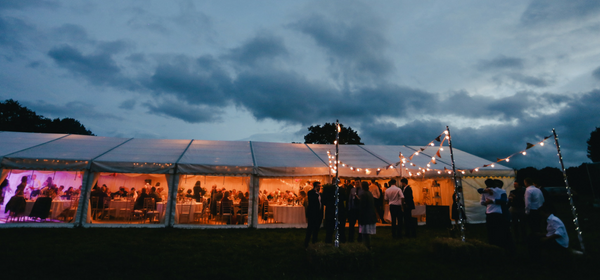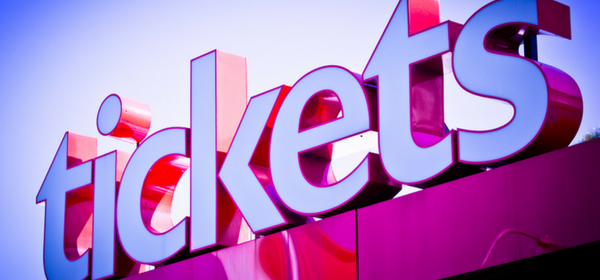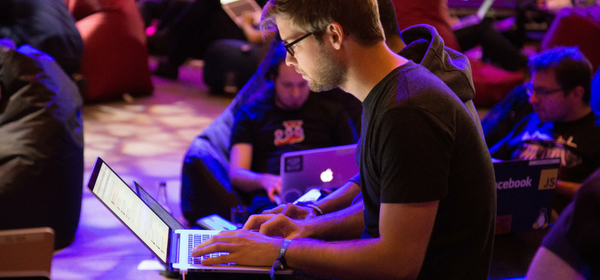
To help you make sure this event runs smoothly and creates an unforgettable experience for everyone attending we’ve put together this helpful A-Z guide for planning your first event.
A - Audience
You can produce an event that's perfect down to the last detail, but it simply won't matter if there isn't a receptive crowd.

So make sure you have done your homework. You have to know there's a market before you commit to your event. Social media is a great and cheap way to make sure there's a buzz in the air, and that you're pitching your event at the right people.
Don't only aim for numbers on your Facebook page and Twitter feed. Engage your followers and ask questions. This free market research could change your whole plan. It also gives you a chance to sell event tickets online, and gauge the response while you have a chance to make changes.
B - Budget
Ask any married couple if they went over budget for their big day and watch the pained expressions on their faces. For a lot of people, this is the first major event they will ever plan. Most of them blow the budget completely.
A professional event planner simply cannot do that. You have to know all the costs at every single stage. Be honest with yourself. Don't gloss over the small costs because they can easily mount up to a ruinous bill at the end.
Everything from the way you sell tickets online to the car parking costs money. Make sure you know how much and budget accordingly. Also, work with proper partners who give you a precise quote, then stick to it.
C - Concept
A strong concept will help you pitch your event to the end customer and the people and partners you need to help you along the way. A powerful, direct message is good for you, too, because it will focus your efforts on your event's core.
Don't generalise, be specific. It will help you secure the right partners, sponsors and can help to boost your online tickets sales in advance of the event – great for event cash flow!
Without a strong concept, you can get bogged down in details and drift aimlessly. Stay on course with a powerful central theme.
D - Discounts
Creative discounts can turn an average event into a success story and a solid one into a best seller.
You can choose from several different pricing strategies and discount tactics. Start with discounted advance ticket sales to a select few as an exclusive offer, and then consider raising the actual main ticket price to slot in a lower tier.
Consider an Early Bird-style offer to people that have registered on your site or social media pages. That way you can sell event tickets online before the event is fully-formed and you can even increase the budget based on the early take-up. Dress it up as an online ticketing discount, or even a test of the event ticketing system. Learn more about early-bird pricing strategies here.
E - Experience
This is your first event, so you simply don't know what is around the corner. It's always the details that will catch you out. Entire events have been brought crashing down because bodged event booking software didn't work, or you run out of refreshments.
These are called rookie mistakes for a reason. You just won't see them coming, but you can prevent them happening in the first place by asking the right people for advice and support. Surround yourself with old hands, let them know this is your first rodeo and stay humble. Don't try and fake it until you make it.

Most will be flattered that you've come to them with the right attitude. They will be happy to help.
F - Floor plan
Almost every event needs a proper floor plan that you need to keep on top of. If you come to the time and you have double-booked a crucial plot, or you haven't accounted for the actual space correctly, then it will undermine all your hard work.

It doesn't matter if it's just a seating plan or a full exhibition centre. Get the dimensions down to the last cm. Make sure the plan you have on paper works in the real world.
Visit the location and check everything with your own eyes and a tape measure. Don't take anything on blind faith, or you could find yourself rearranging the whole event as the doors open.
G - Gala
Almost every event gives you the potential to add a gala dinner to proceedings. It's an opportunity to thank the sponsors and paying exhibitors with free tickets. It's also a potentially serious upsell in its own right.
You can issue two free tickets to minor sponsors or a free table as part of the title sponsorship package. Then you can sell event tickets online, or on the door, to cover the costs and turn a profit. This is an exclusive invitation, with an opportunity to meet the organisers and any special guests. If you pitch it right, tickets should fly out the door.
A charitable angle is always a powerful draw for a gala dinner, and you can effectively plan it as an event within an event.

H - Hustle
Yes, this term has been turned into a cliche, but you'll need to really hustle if you want to make your first event go with a bang.
The chances are nobody knows you. So, even if you have the power of a big brand behind you, then you're going to need to work seriously hard to get the best partners onside.
They are busy, and they have options. So you have to sell yourself, as well as your tickets. This is where you show you are special. Make them believe in you and your event partners, staff and everybody else will go to the trenches for you.
I - Inspiration
The best event planners don't quite copy, but they certainly appropriate.
Take your critical eye to other people's events to figure out what works, and more importantly what doesn’t. Then see if you can adapt it to make it work for you. See how they're using your concepts, too. Watch them in action, then decide if it's really a good idea after all.

Now you're planning our own, you'll see other peoples' events in a whole new light, and you'll start to assess everything from the floorplan to the marketing strategies. Study websites and adverts. Understand why the leading players do things a certain way before you follow suit. Here are some top tips for helping you become more creative in the next week.
J - Joy
Never lose sight of the fact that thousands of people would kill to be in your shoes right now. So take some pleasure and yes, joy, in the fact that you're putting together your first event.
There will be many more, and you're going to learn from your mistakes. The dark times you go through will all be worth it when your client, employers and the attendees all sing its praises.
Your tickets are going to sell, the acts you've booked will hit all the right notes, and the food will go down a storm. Just remember, this is what you always wanted to do. Now it's here, so enjoy it!
K - Keynote Speaker
In the old days, keynote speakers were limited to large tech events and academic environments. Not anymore. Now you can draft in a big-name keynote speaker and use them to effectively launch your event.

It's worth investing in a big name, in your industry or even a local celebrity, because you can use them as part of your promotional campaign and watch their impact on your ticket sales. You can plan to record their address, and then release this on YouTube and other mediums.
L - Location, Location, Location
Your location is absolutely critical, and there is no one size fits all. It depends entirely on the type of event you are running and the kind of crowd you want to attract.
Sometimes you need an exhibition centre, and that limits your options, but be prepared to think laterally. Is there a venue that suits your mood better than a hangar? Can you spend less turning a spectacular venue into an exhibition centre, rather than turning an exhibition centre into a spectacular venue?

Think about your physical location and also look for a location that fits your message. Planners have created spectacular events in disused railway stations, football stadiums, museums and everything in between. A cohesive image, from your online branding right through to the event location, can help you make a lasting impact.
M - Microphones, Lights and Cameras
We have all cringed in sympathy when the microphones fail at a big event. But this could have all been fixed with a dry run, rather than a 10-second mic check.
Lights fail, or you need more than you thought when you turn the main lights off. This can leave you scrambling to fix issues you could have seen coming. That will have a knock-on effect and stop you fighting the genuinely unforeseen fires during the event.

Entire events have been held back by a loose wire or a blown fuse. Don't be that event planner. Set up well in advance and do a dry run.
N - Network
Even if your event is aimed at the general public, you need the support from local businesses. So connect with them digitally, but also get in touch with the local business forums, your local business chamber and even other event planners.
Co-operation beats competition every day of the week. If you can get the local business community onside, then your event is going to work.
Help other people and offer cut-price deals or free tickets where you can. You can even build in resale rights or a commission. You will be amazed how much of a difference this small show of goodwill makes to your event.
Share your contacts, too, from the venue managers you work with to your caterers. It will be reciprocated.
O - Optimism
Optimism is a double-edged sword. Without it, you wouldn't be planning your first event at all. You wouldn't be reading this right now. But too much can be your undoing.
Follow the adage: 'Aim for the stars, but keep your feet on the ground'.
An optimistic approach will keep you going when others throw in the towel. It will make you strive for the very best event, and you need it.
Blind optimism, though, has led many events down the path to destruction.
P - Promotion
Promotion is the lifeblood of your event, and you need to get creative. There are more avenues than ever before to create a buzz around your event, but there is also more white noise, and you're going to have to work hard to be heard.

Social media is a powerful tool when it comes to events, and Facebook is just the start. If you have strong visuals, then Instagram and Pinterest can reap massive rewards. An ongoing blog is a great way to build a following and an email list. But don't think that digital is the only way.
Local radio is still surprisingly effective, and you have to look at the regional print press, too.
Some event planners prefer the guerrilla marketing approach, too. If you can literally stop traffic without getting in trouble, then it's fair to say you're going to get coverage and send your event ticketing systems into overdrive.
Q - Quality
Whatever you do, do it well. Don't get too ambitious and make a poor attempt at luxury. If your budget is capped, and you need to compromise, then do the basics exceptionally well. Don't over-reach and do a bad version of a great event. Do a great version of a simple event instead.

If money is tight, then look for charm, simplicity, and a smile. Just look for an angle that fits your budget. If you can't do a sit-down five-course dinner for 300, look into top-class street food. If you can't afford the venue you want, then look for something quirky and fun.
Do the best version of that event, not a budget version of something bigger. Price it right and make that event ticket exceptional value.
R - Resilience
You will work late on the days running up the event and spend the whole time fighting fire after fire. Your adrenaline will spike well before the opening bell and subside just after the last person has left the building. There is no way around it; your first event will be intense.
Know that in advance and prepare for it. Don't let your emotions get the better of you. If you lose it, the whole event is in jeopardy. So don't get caught up in minor drama and make sure you're still swinging at the end.
Keep yourself on an even keel, even if that means taking five minutes and some deep breaths to centre yourself after the latest crisis.
S - Sales
Event planners are often creative people that don't like to get caught up in the grubby world of sales. But the truth is that if nobody comes to your event, then there won't be another one.
So, you have to embrace sales, but you don't have to behave like a used car salesperson. There are all kinds of digital sales methods that will feed your ticketing systems.

You can also contract a third party to deal with your event booking and leave you to focus on the actual planning side. The most successful event planners keep a keen eye on the sales team, though. Work hand-in-hand with them to tailor the event to the people buying the tickets.
If you run a larger event and you sell space, sponsorship or anything else to other companies, then you really need a specialist who can maximise your revenue and help pump badly-needed funds back into your event. Don't think you can do all this yourself; you simply won't have time and slots will go unsold.
T - Timing
Even major sporting events have been hit hard by schedule clashes that meant potential attendees had to make a choice. You can also pay the price if you run an event on a public holiday or when a large slice of the population takes their vacation.

Study your local event guides, well in advance of announcing your dates, and try not to go head-to-head with other major attractions. Unless you are working under an established brand, don't try and compete with anyone.
If you can, schedule your event as far away as you reasonably can in the calendar from any event that could possibly look like competition. Do that, and you might find an unlikely ally. You could even cross-promote and sell event tickets for each other.
U - Unlucky
Scrub this word from your vocabulary if you want to be a successful event planner. There is no bad luck, only bad planning.

Things will go wrong; you will have no-shows, and you will be smacked in the face by problems you just didn't see coming. Do not complain about your bad luck. By the time you have processed the information, you should already be working on the solution.
Don't complain, just fix. That's the mantra of a great event planner.
V - Vegans
If you're planning to feed people, then you need to take into account specific diets and allergies in the modern world.
Yes, this is an added layer of complication, but it's simply professional to make sure there's a vegan, as well as a separate vegetarian dish, so the non-meat eaters have a choice.
You cannot cater to absolutely every allergy, but try to avoid obvious problems like shellfish and peanuts. If you can incorporate a gluten-free option as well, then you'll have most of the bases covered.
It's good form to ask attendees in advance if they have any specific allergies and do your best to work around them.
You can often do this via your online ticketing system at the point when customers are purchasing tickets, which takes another job off your hands and automates the entire process.
W - WiFi
It might be a damning indictment on the modern world, but if you don't have functional WiFi at your event, then some people will not be happy.

Check with the location about their WiFi in advance and make sure it can cope. If not, you might have to bring in an outside service and make sure that everybody is connected.
X - X-Factor
Whatever kind of event you're planning, always strive to give it a unique flavour. Don't be a cookie-cutter event planner. Always try and capture the unique spirit of your client and find a way to present it spectacularly.
Great artists, photographers and musicians go beyond the basics. Yes, they're technically superb, but there's also a connection.
So what does your client stand for? What is their USP? Focus on that and think of a way you can tell the world.

Y - Yes
Welcome to one of the simplest and most dangerous words in the English language. You want to keep everybody happy, so you're going to say it a lot and figure out how to make it happen afterwards.
That's normal, especially for a new event planner that wants to make everything go perfectly. But before you say yes, take a breath and think about what you're agreeing to. Some tasks, some requests, can take up way too much of your time. That can leave you playing catch-up elsewhere. Say it too often, and you'll end up chasing your tail, while the event booking falls by the wayside.
Z - Zones
Yes, you need to be in the zone when you're setting up your event, but you need people on the ground when it all kicks off as well. Separate your event out into zones and have a chain of command for each one.
Not everybody can come to you, or the event manager if there is one. So, make sure there is a trusted member of staff in every part of the event. Without this, you'll find your staff running around like headless chickens, and your radio earpiece and your phone will pretty much melt from all the incoming calls.
That doesn't work. Put the right people in charge and make sure that there is a senior member of staff that is always accessible, to everybody.
With This Guide, Enjoy Event Planning Success
So, that's the A-Z guide for planning your first event. Keep it safe, refer to it when you think you're heading off-track and keep driving forward. Good luck!








